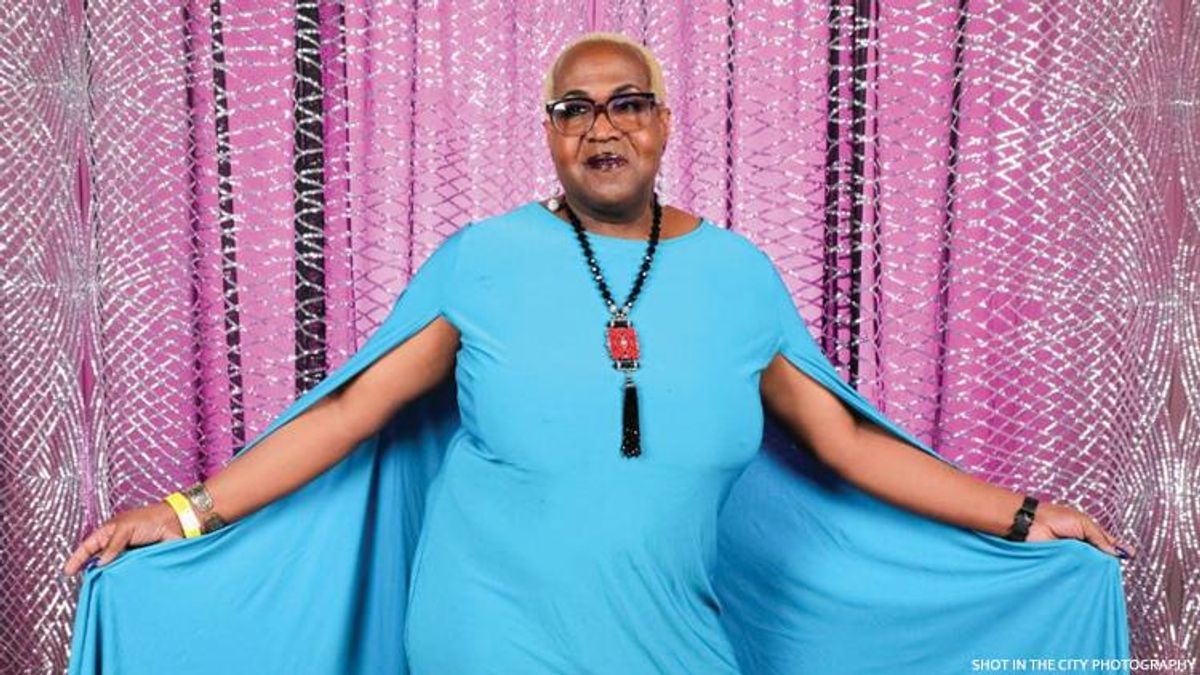After changes in its leadership roles last year, the Black AIDS Institute reached out to Toni Newman, an author and advocate for sex workers and people living with HIV, to lead the 23-year-old organization. At least temporarily, anyway.
The Los Angeles-based nonprofit focuses on HIV education, prevention, and treatment among African-Americans, a group disproportionately affected by HIV. BAI has nearly 40 employees and a $5 million annual budget.
Her new role as BAI’s interim CEO makes Newman one of very few Black trans people heading a national nonprofit. She also recently served as an interim CEO for San Francisco-based LGBTQ+ youth organization Lyric. Newman is a distinguished faculty member at the Transgender Strategy Center in Los Angeles and the chair of the board of directors at TransCanWork, which assists with employment opportunities for the transgender community.
Before her work at Lyric, Newman was executive director of San Francisco’s St. James Infirmary clinic, which provides services to sex workers, one of the few organizations in the nation to do so. In addition, Newman was a fundraiser and legislative aide for Equality California, the state’s LGBTQ+ organization.
We recently chatted with Newman about her new role at BAI and her thoughts on being a Black trans female leader within the nonprofit realm.
“I’ve been in this journey as a trans woman of color for 26 years, since 14th Street in Manhattan, when the epidemic was at its heated core,” recalls Newman. “And all of those young ladies are passed on…so it touches me to be able to work with the Black AIDS Institute, a national think tank fighting for Black and brown folks [affected by] HIV. I would love to focus on Black women and trans women of color…. Those [HIV] numbers are climbing, those numbers are concerning. So as a trans woman and as a [Black] woman, I would love to focus on that.”
“I was touched by HIV 26 years ago and then I became an HIV test coordinator,” she continues. “I’ve been in the van [saying to people], ‘Welcome, let’s get you tested.’ And I’ve given bad news to people, I’ve given good news to people…. I know what that looks like as a frontline staff member, all the way to the manager and director. So I’ve had my hands on the pulse of HIV for about 26 years. And it’s just amazing to be here.”
Newman has also been a vocal advocate for decriminalizing and destigmatizing sex work, and even detailed her own experiences as an escort in her 2011 memoir, I Rise: The Transformation of Toni Newman. She remembers a specific incident when, after a meeting in Washington, D.C., a man came up to her saying he’d heard a rumor that she was a former escort and assumed it was a ridiculous lie since she was a CEO, after all.
She remembers replying, “How do you think I got here? No pun intended, by serving very intelligent men like yourself, who enjoyed whatever they enjoyed — so whoever whispered to you at that table, in fact, told you the truth. And I have a book you can read to entertain the whole story!”
Newman worked as a professional mistress for 10 years, alongside another female mistress and male master. They were known as the Erotic Professionals and had a roster of wealthy and celebrity clients. With business partner Alton Willoughby, Newman wrote a screenplay about the trio’s escapades. The screenplay resulted in the short film Heart of a Woman, made in 2016 and starring two talented trans women of color, Angelica Ross (Pose, American Horror Story) and Isis King (America’s Next Top Model, When They See Us). Now Newman is excited to be in the process of making the story into a full-length feature film. “I’m excited because I really was loving the short film,” she says.

Toni Newman chats with a colleague while working as executive director at St. James Infirmary in San Francisco, one of the nation's only orgs to focus on helping sex workers
Another pivotal moment in Newman’s storied life happened back in 2012, when she had the opportunity to meet and interview the late, great Black female writer, Presidential Medal of Freedom recipient, and source of eternal wisdom, Dr. Maya Angelou. Angelou and Newman both had connections to Wake Forest University, a prestigious North Carolina school.
“Maya Angelou came to Wake Forest in 1982 as a professor, and I came to Wake Forest in 1981 as a freshman,” says Newman, explaining why she named her memoir after one of Angelou’s most famous poems, “Still I Rise.”
Newman continues, “So I got to hear her poems and her speaking when I was at Wake at different events — and that poem, ‘I Rise….’ I felt that I was under the feet of a lot of folk who felt that they could just take charge and treat me any kind of way when I was at the bottom, the very bottom, so she was very instrumental [to me changing that attitude].”
Newman says Angelou was “very gracious, and we talked about equality for all genders…and just how people should live their authentic lives. She said, ‘Happiness comes from within, and let no one tell you how to be happy. Your life is yours to do as you will, as God made you. So live it…. Just be.’”
Newman says those words made a huge impact on her, and she carries those messages with her to this day. She also admits that being a visible Black trans leader in what is still a primarily white heteronormative world has its challenges, but she says integrity and perseverance can take you far.
“I learned early on to listen,” says Newman. “Of course, I went into this work and my bosses were gay white men with power. I was frontline, no power. I learned from them. And I listened to them. It’s how I’ve maneuvered my career from an HIV test coordinator to director of development to CEO. I’m a good listener. And I know when to take the good advice from the bad advice on how to succeed. I started my journey under a gay white man.... And I learned quite a bit from him. Some of the habits I did not take, because he was a white privileged man of power, and I was not in that category of power — but I knew the only way to help was to be at the table.”
“I had to just knuckle down and say, ‘Let me show you, I won’t say much. I’ll just do the job.’ And that’s been my approach,” Newman concludes. “Give me the chance. And I’ll show you rather than talk…. That’s how I maneuver when I go into interviews — I just need the chance. My résumé speaks for itself, but I need the opportunity…. And it has worked out quite well.”














































































